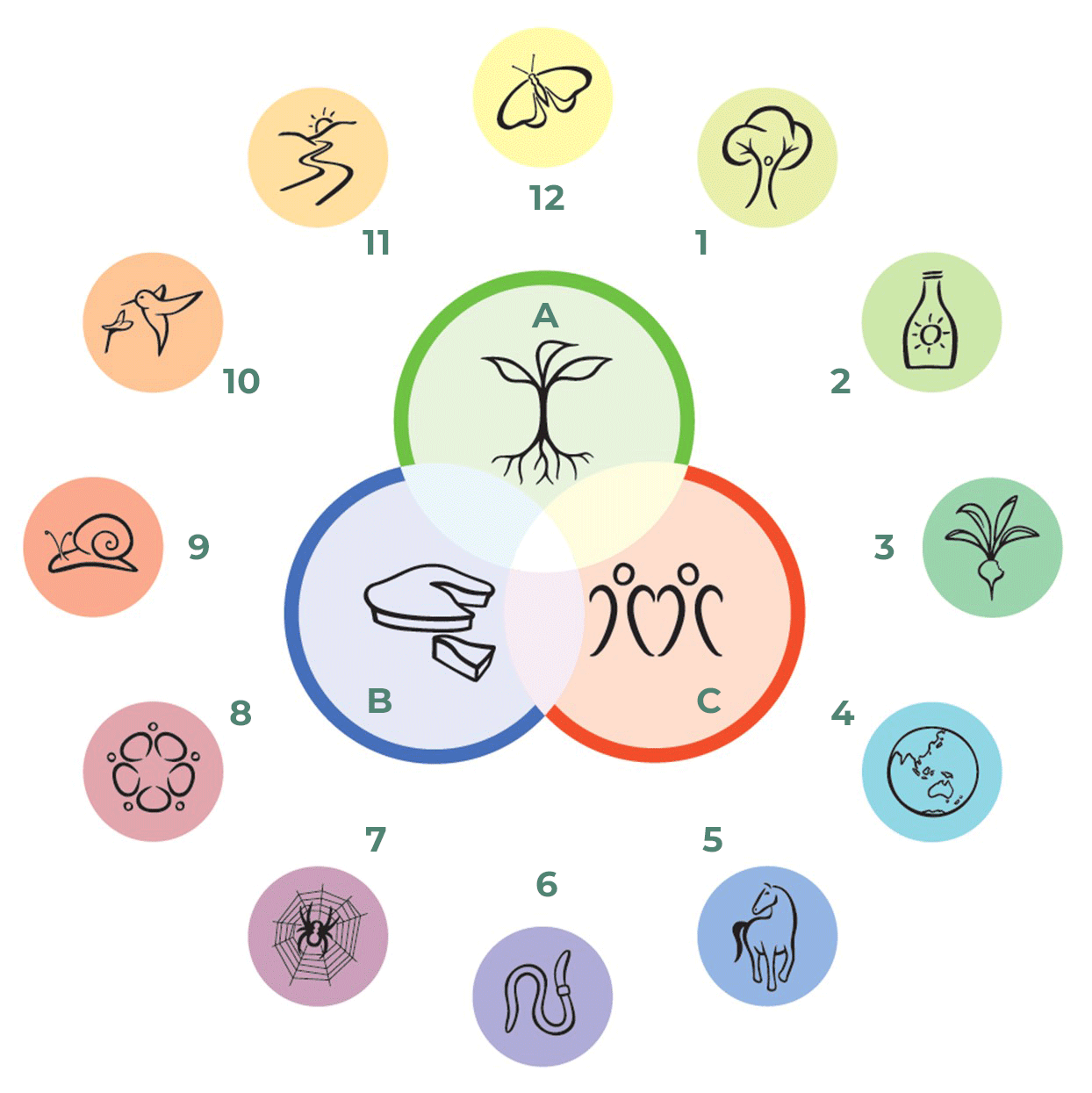
A sustainable living place
in South ardèche
Aqua for Water, the source of all life, which flows in abundance around us: the river Chassezac 250 metres away, the stream running alongside the lodges that becomes a waterfall when it rains, the spring at the bottom of the garden...
Terra for the Earth, which welcomes and nourishes us: the sandstone walls of the building that we will maintain and complete with interior lime-hemp insulation and earth rendering, the dry stone walls supporting the cultivation terraces, the loamy-sandy soils in which we will grow our aromatic and medicinal plants as well as our fruits and vegetables...
Silva for the Forest, this efficient and resilient ecosystem that nature aspires to become: surrounded by wild woodlands, we will grow a wide variety of edible and medicinal plants, welcoming wildlife and recycling plant matter in situ.
The building
Perched in a small valley above the road to Chambonas, the building is the first thing you notice. With its thick stone walls and red shutters, it is intriguing. Dating from 1630, its former owners assigned it several functions. Watermill according to the latest, due to the small stream that runs along the house. This unfounded assumption earned it the name “Moulin de la Chargeadoire” for the past 20 years. More likely, it would have been a silkworm farm and an inn on the silk and wine route. In fact, the stone walkway that passes just above was at the time the main road leading to Les Vans. Later, it was occupied by large families of peasants and craftsmen, who raised animals and cultivated the terraces above.
THE REnovation
In order to improve the thermal and ecological efficiency of the building, as well as the comfort it provides, we have planned work over several years: restoration of the dry-stone walls supporting the terraces, development of a phytopurification system, renovation and insulation of the roofs, collection and storage of rain water, installation of solar panels, installation of double-glazed windows, renovation of the electrical and heating systems, installation of controlled mechanical ventilation, internal wall insulation with lime hemp… These works will be carried out with respect to the environment and resources, giving priority to natural and local materials.
The Gardens
The building is surrounded by more than one hectare of land in "faïsses", remnants of farming activity in the past. These cultivation terraces were laid out on sloping land to help rainwater infiltrate the soil, prevent erosion and allow the land to be cultivated. The retaining walls were made from stones found on site or nearby. We want to enhance this beautiful heritage by gradually bringing the terraces back into cultivation, mainly with aromatic plants. Just above the building, we created a small vegetable garden as soon as we arrived. At the very top of our land, a clearing with ditches and a reservoir will become a forest garden, planted with fruit trees, shrubs and perennials. Finally, we will maintain and support the evolution of our wooded areas to encourage biodiversity.
The gardenERS
The gardening team is made up of:
Hugo, who was born in Marseille and moved to Gravières shortly after he was 3 years old: “As a shovel and rake specialist, I love digging holes in the garden. I'm also very good with a watering can and spray gun. I am a great ally for spotting slugs and snails. Finally, I love helping my parents harvest seasonal fruits and vegetables.”
Jeanne, born in Paris where she studied before working in Marseille for 14 years: “After 10 years in international cooperation, I switched to developing agroecological projects in urban areas. Although they were in line with my interests, these projects were often limited by institutional constraints and not concrete enough for me. The desire to go out into the countryside and get my hands dirty won out.”
Stéphane, born in the Pas de Calais where he studied and started his professional life before moving to Marseille: "After 12 years as a project manager in industry, I wanted to get closer of nature and to work with my hands, reconnecting with my childhood with my grandfather, a landscaper- gardener, and my father, a building craftsman.”
After 8 years together in Marseille, we decided to combine our skills and knowledge to launch a life project based on our values in this incredible region of the Cévennes d'Ardèche.
The eco-responsible approach"
Our eco-responsible approach is based on permaculture, a method that draws inspiration from nature to create pleasant and resilient places to live. The ethics of permaculture are:
A. Earth care
B. People care
C. Fair share
We will apply these 12 principles to design and manage the site's spaces and activities:
Observe and interact
Catch and store energy
Obtain a yield
Apply self-regulation & accept feedback
Use & value renewable resources & services
Produce no waste
Design from patterns to details
Integrate rather than segregate
Use small and slow solutions
Use and value diversity
Use edges & value the marginal
Creatively use and respond to change
Our project benefits from financial support from ADEME as part of the Destination France plan.











